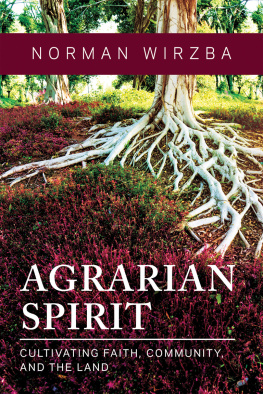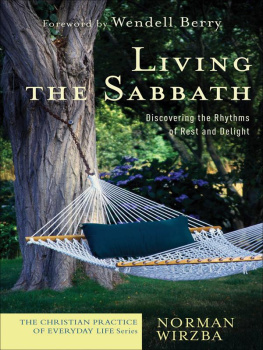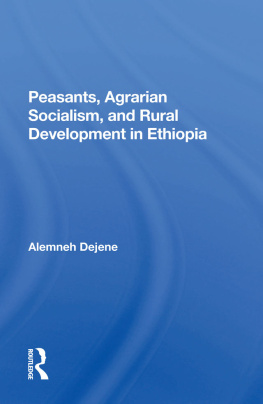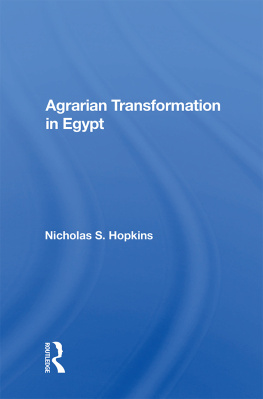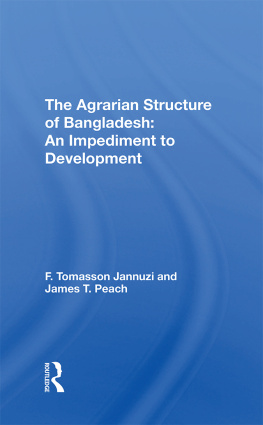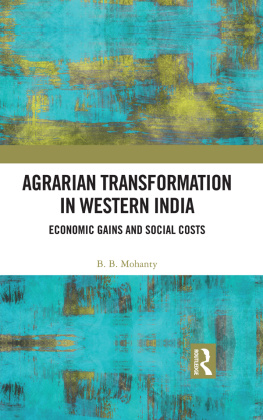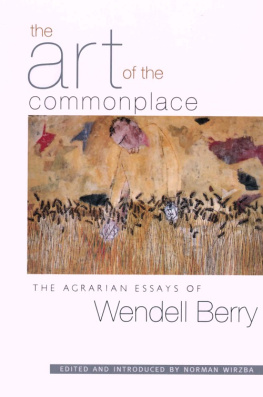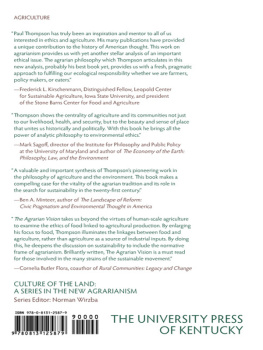Landmarks
Page-list
ADVANCE PRAISE
for
Agrarian Spirit
Norman Wirzba has done it again: this isliterally and figurativelythe most grounded (and grounding) book Ive read in a long age. It will lead you to contemplation, and then, if youre lucky, to change.Bill McKibben, author of The Comforting Whirlwind
Norman Wirzba traces, in bold compelling strokes, the difference between the world taken as creation to be inhabited in gratitude and as nature to be exploited in greed, the difference between the world as commodity and the world as relationship. In the context of that difference he explores specific hands-on practices and disciplines that make it possible to live as a soilembracing creature of God outside the grasp of an anti-creation economy of greed. This welcome book offers transformative energy and courage for a different way of living.Walter Brueggemann, author of A Wilderness Zone
Agrarian Spirit is a beautiful consideration of what it means to be interdependent and embodied. Wirzba opens up the possibilities of stewardship and care to all humans living in community, no matter their locale or vocation, and roots the truths of an agrarian faith in the example of Christ.Grace Olmstead, author of Uprooted
If incarnate spirituality sounds like an oxymoron to you, let Norman Wirzba be your guide to the agrarian arts of faith. This book is the culmination of decades of thinking and writing and work, and there is no writer better equipped to articulate how an agrarian sensibility should shape our spiritual practices.Jeffrey Bilbro, author of Reading the Times and editor-in-chief at Front Porch Republic
Agrarian Spirit isnt luddite, nostalgic, or angry. Rather, it is a gentle, wise, and hopeful call forward, casting a vision for how to live as Gods people in Gods world. I loved this book, and it flooded my imagination with pictures of what the Kingdom of Heaven could be, right now, right in my neighborhood.Andrew Peterson, author of The God of the Garden
This lovely book is full of invigorating surprises. For the many of us who dont live on farms, Wirzbas reflections offer an invitation to reclaim in practical ways our relationship with the earth and its creatures who, with us, depend on all that has been entrusted to us for stewardship, for sharing, and for grateful enjoyment.Marilyn McEntyre, author of Caring for Words in a Culture of Lies
What ails us most is not susceptible of mere technological remediation, which by now has become an expensive enterprise in endless and ineffectual tinkering. Our most serious problems run much deeper, and they require the diagnostic and prescriptive powers of a mind at once capacious, clear, and reverenta mind such as we see at work here. This would merely be a fine book were it not also a necessary one.Jason Peters, author of The Culinary Plagiarist
Incisive in its critical analysis, Agrarian Spirit is inspirational in how it opens up renewed possibilities of collective flourishing in our wounded world.Kate Rigby, author of Reclaiming Romanticism
With uncommon depth and breadth, Norman Wirzbas Agrarian Spirit urges us to embrace and celebrate human and non-human creatures as cobecoming, embodied expressions of Gods creating and sustaining love. He urges us to acknowledge our self-insufficiency and our dependence on others as a gift and as a challenge to develop the nurturing relationships that can heal our world and inspire our hope.Steve Bell, author of the Pilgrim Year book series
Norman Wirzbas agrarian spiritual exercises reposition us down and among all living things, close to the God who sustains the life of every creature. Agrarian Spirit renews our desire to make a home in this world and to keep faith with the generations coming after us.Stephanie Paulsell, co-editor of Goodness and the Literary Imagination
AGRARIAN SPIRIT
AGRARIAN
SPIRIT

CULTIVATING FAITH, COMMUNITY,
AND THE LAND

NORMAN WIRZBA
University of Notre Dame Press
Notre Dame, Indiana
Copyright 2022 by the University of Notre Dame
Notre Dame, Indiana 46556
undpress.nd.edu
All Rights Reserved
Published by the University of Notre Dame Press
Library of Congress Control Number: 2022935746
ISBN: 978-0-268-20309-2 (Hardback)
ISBN: 978-0-268-20311-5 (WebPDF)
ISBN: 978-0-268-20308-5 (Epub)
This e-Book was converted from the original source file by a third-party vendor. Readers who notice any formatting, textual, or readability issues are encouraged to contact the publisher at
For Wendell Berry, Wes Jackson, Fred Kirschenmann,
Vandana Shiva, Gene Logsdon (), and Ellen Davis
CONTENTS
PREFACE
T he God of scripture is an agrarian God. This does not mean that God hates cities or shuns wilderness. Instead, it means that Gods reality is constantly revealed in the divine power that creates, sustains, nurtures, liberates, empowers, and heals the world. These are each agrarian ways of being that have as their goal the flourishing of all creaturely life, for it is precisely in each creature realizing its unique potential that God is glorified. What we do not see in scripture is a God who mines, clear-cuts, commodifies, abuses, or abandons creatures. Put another way, the God at work in Israels history, become incarnate in Jesus, and made abidingly present in the Holy Spirit manifests ways of being that are strikingly at odds with the economic policies and political priorities that define our modern world.
Throughout scripture God is often characterized as a gardener, farmer, shepherd, and carpenter. Of course, none of these characterizations exhaust the depth of Gods ways with the world, but what they communicate is that in Gods estimation nothing is more fundamental or important than to nurture the life that nurtures us. The knowledge and the skills of nurture, however, which we might also describe as the patient attention that inspires the care of each other, are not easily obtained. They have been eroding for some time as people increasingly, and not through any personal fault of their own, shop and purchase their way through life. The speed and inattention with which many people now move through their daysit is no accident that social scientists refer to our time as the Great Accelerationindicate that it will take considerable intentional effort and communal support to grow the courtesy and cultivate the kindness that genuine nurture requires.
I believe that agrarian traditions have a great deal to teach us about how to live in this world in ways that honor Gods desire that creatures flourish and flower. Right from the start, scripture invites human beings to participate in Gods gardening ways with the world so as to appreciate lifes fragility and splendor, and its vulnerability and virility. This would be a genuinely grounded spirituality in which the work of ones hands joins with the life-creating power of God that is always and already at work in forests and fields and active in bees and sheep. It would be our earthy and embodied participation in Gods agrarian Spirit.
There is no shortage of books dealing with spiritual themes and spiritual practices. As I have written Agrarian Spirit, my aim has been to highlight the difference that agrarian ways of thinking, feeling, and working make for how several aspects of a spiritual life are conceived and realized. The chapter on prayer, for instance, does not attempt anything like a thorough examination of this central practice. Instead, it reconsiders the action of praying and its goals in light of agrarian sensibilities. Similarly, the chapter on humility shows how agrarian ways of living with plants and animals can help us understand what humility is about and why it matters. The chapter on descent asks how our thinking about mysticism is transformed when our focus is down and among rather than up and away. My hope is that

